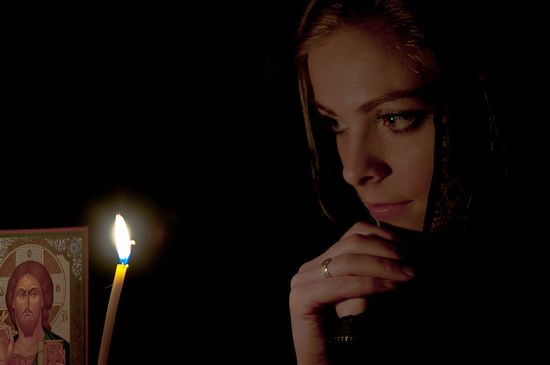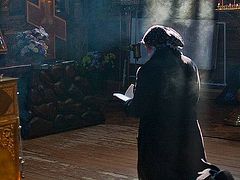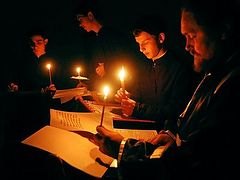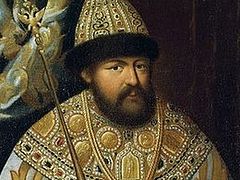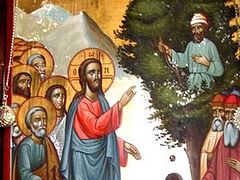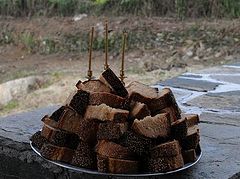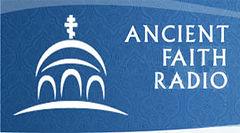The following is from a discussion on Ancient Faith Radio, by Fr. Evan Armatas and John Maddox, as part of their "Orthodoxy Live" program. This discussion is especially aimed at those who are new to Great Lent, but even those who have been practicing the Lenten fast all their lives will find much interesting and helpful information that they may not already know. More questions about Great Lent can be asked on the "Orthodoxy Live" homepage, on their website.
Fr. Evan: We are offering a special edition of Orthodoxy Live in and around the theme of Great Lent, Pascha and Holy Week, the Paschal Season, Tridion, and a basic primer about Orthodoxy and Great Lent. We are taking the experience of the many questions we've been asked during the past year, and encapsulating them into a program about the season of the Church called Great and Holy Lent.
John Maddox, welcome to Orthodoxy Live. It's good to be with you again.
John Maddox: Thank you. It's good to be back, Father.
Fr. Evan: This is a special opportunity for us to have a dialogue about Great Lent and the seasons before and after it.
John Maddox: Well, I know we have a lot of listeners who are new to this. They are either inquirers or catechumens. Perhaps this is even their first Great Lent. And I can remember, as an Evangelical Christian, not thinking much about Lent or what that meant. However, I've noticed in recent years, some of my Evangelical friends are starting to talk more about Great Lent. But it's usually along the lines of, "Well, I've decided to give this or that up for Lent." So I think this is going to be a helpful program for anyone who is interested in how the Ancient Church has always viewed Lent, and how the Orthodox Church does it today.
Fr. Evan: Yes, it is a season that is really the highlight of the year for an Orthodox Christian, and all that we do within the Liturgical year points us towards the celebration of our Lord’s death and Resurrection—the Glorious celebration of Pascha. For the Orthodox, Pascha is the feast of feasts that sets the rhythm for all that we do. And for those who, as you said, may be approaching this or are learning about it for the first time, we should say this is going to be a program that covers the basics. We won't have the time or ability to go in depth, but nevertheless we hope in some manner to express the depth and richness of this season.
John Maddox: That's right. And something that would be helpful, just at the start, would be for you to give us the historical perspective. Where did this all start, and why?
Fr. Evan: This is something that comes up in conversations on Great Lent. How did the Church arrive at such a season and structure of services? And whether you've been through Lent before or this is going to be your first season, you will see that this is a rather complicated season; there is a lot going on, a number of services you haven't seen. There are new names and phrases for things. Certain spiritual disciplines are highlighted that you may not be aware of, or at least you don't typically them see during the rest of the season.
So, let’s begin by saying that the Church arrived at this season in time and space. In the beginning, it didn't have the current structure it has now. We have to mention that. In fact, if you look at the historical resources we have that speak about the early celebration accompanying Pascha, one of the first things we see is a fast; and by fast, or nestia in Greek, is implied complete abstinence from all food and water. Thus, we see that in the early Church there was a complete and total fast—usually on Friday and Saturday before the Sunday of Pascha. I don't know if you were aware of that?
John: No that's new to me. I had certainly heard about the preparation for Baptism, but I had not heard that there was complete abstinence on Friday and Saturday from food and water.
Fr. Evan: Yes, that's where it started; and very early we even see Christians timing it to make it a forty-hour fast. They would keep a fast from any water or food for forty hours, in preparation for the celebration for our Lord's death and Resurrection. Of course, two questions may quickly come to mind. Why this absolute fast, and why the number forty? There are two quick answers to that. The first is that when the Lord was with us, He was asked why His disciples, unlike the Disciples of John, do not fast. He responds: "How can they? How can those who are with the Bridegroom fast?" Of course Christ likens Himself to the Bridegroom and his bride is the Church. So, in other words, when the Bridegroom is with you, when you are at the wedding feast, there is no fasting, but rather feasting. Then He said, "The day is coming when the Bridegroom will be taken away, and in that day, My bride, or I should say, My disciples, will fast” (cf. Mt. 9:14-15). So, very early, Christians understood that a fast—any fast—was always connected with their absence from the Lord and their subsequent reuniting with the Lord. This gives us a new perspective on the fast that we keep each week, beginning on Saturday evening through Sunday morning, before receiving the Eucharist.
John Maddox: It is in preparation.
Fr. Evan: Yes. It's total preparation. It's a Bibical mandate. It heightens our awareness of the absence of the Lord from our lives. So, we are reminded of the distance there may be between ourselves and the Lord; and then, receiving the Eucharist, with the celebration of Pascha, we are reminded of His imminence, of His absolute presence, of the unification of our lives with His.
John Maddox: So what about the forty hours?
Fr. Evan: This is probably most easily attached to the Old Testament story of the Israelites in the wilderness. We all know the story in which the Israelites, having left the bondage of Pharaoh and having exited with Moses from Egypt, travelled through the Red Sea into the wilderness, and wandered for forty years there for their disobedience, before they are given the opportunity to enter the Promised Land. This connection with their wandering is made specifically in the prayers of Great and Holy Lent. The early Christians understood that. They understood this period of time, that the people of God had been apart from God, and unable to enter into the full covenant and promise of His presence. Thus, the forty hours naturally comes from that remembrance. The Old Testament has a number of additional stories that incorporate the number forty. We can think of some quite easily, can't we?
John Maddox: In the New Testament, Jesus is in the wilderness for forty days.
Fr. Evan: In that specific story, He prays and fasts in his own way to prepare for His confrontation with Satan—the evil one. So this is a preparatory period before doing battle. In the Old Testament, we have the story of Noah and the Ark, in which he stayed forty days and forty nights. We have the story of Moses, who spends forty days in preparation on the mountain, to receive the Ten Commandments of God. We have the forty days of the prophet Elijah on the mountain before he confronts the false prophets. So, forty is a number that is very familiar in the Old and New Testament. For the early Christian it was a time frame for looking at preparation in a Bibical manner. It wasn't something they just drew out of thin air.
John Maddox: But it's not something that is practiced everywhere today. I wonder why that is?
Fr. Evan: Well, in time, the Church began to develop, and you even see evidence in the early Church of variant practices. While some may have fasted Friday and Saturday, we have evidence that Christians would fast longer than that, incorporating the week prior. Very early on, we see by the time of the First Ecumenical Council the establishment of a season—forty days prior to the celebration of our Lord's death and Resurrection, the great Feast of feasts, Pascha. There are some wonderful resources for people if they want to look at the development of this fast historically. We'll talk a little more about the resources people can find, but if people are interested in some reading that will help them understand how things worked in the early Church and how practices became set as they are today, you can certainly look at Fr. Thomas Hopko's book Lenten Spring, or Fr. Alexander Schemann's work, Journey to Pascha. There is also a nice little work called The Year of Grace of the Lord—a scriptural and liturgical commentary on the calendar of the Church by a monk of the Orthodox Church. Any one of these can help us, but one of the things I want to point out is that by the year 400, there is record of a visit by a pilgrim named Ethodea. Do you know of this pilgrim?
John Maddox: That's a new name to me.
Fr. Evan: She was a pilgrim who went to Jerusalem and wrote about her visit. In it her record we see that she wrote about a fast of forty days in Jerusalem. This is in the fourth century. And of course, the Apostolic constitutions, written around the year 400 A.D., proscribe a forty-day fast. As we move forward to the Council of Trulo, which occurs in 692 A.D., we see the seven weeks of Lent being mentioned, and we get the idea that this practice is generally accepted in the East. By the eighth and nineth centuries, it is universal. Which might beg the question: If we started with something a little more simple, what does it look like now? If you've never gone through this Lenten season, you might wonder: what does it look like?
John Maddox: Moreover, the East differs a little from the West. The West has a forty day fast, but the East actually fasts longer than that, even though Lent is forty days.
Fr. Evan: Yes, Lent itself is forty days, and one of the reasons for that—and it's a curious thing—is that Church never viewed Saturday and Sunday as fast days. If you look at it very technically, today in the West [i.e., in the Roman Catholic Church.—Ed.], Lent begins on Ash Wednesday and concludes on Good Friday. So if you count it up, that's forty days. Whereas in the East, the fast begins on a day we call "Clean Monday" and it concludes on the Vespers that concludes Lazarus Saturday. But I think we are getting ahead of ourselves, I think we should probably back up a bit and help people understand the entire breadth of the season.
To be continued.

